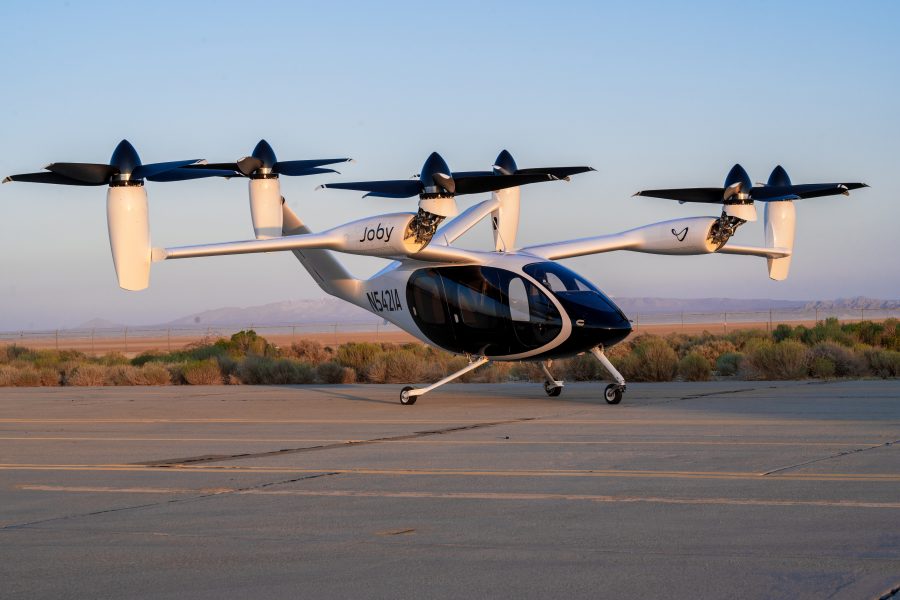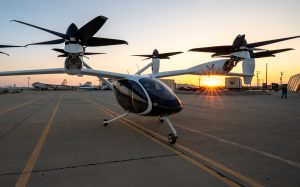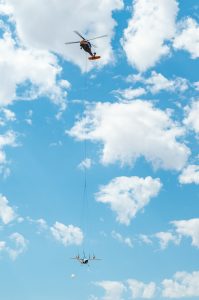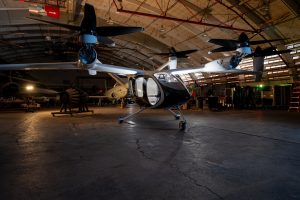A sleek, futuristic, six-rotor aircraft stood behind a red ribbon at Edwards Air Force Base, Calif., on Sept. 25—marking the latest milestone in the Air Force’s involvement in the “electric air taxi.”
The electric vertical takeoff and landing (eVTOL) aircraft from Joby Aviation was unveiled at Edwards a full six months earlier than originally planned when the Air Force Research Laboratory announced a contract extension with Joby in April valued at up to $131 million with options for up to nine aircraft.
The aircraft arrived at Edwards last week and has already conducted three “hover” tests, Joby Executive Chairman Paul Sciarra noted at the ribbon-cutting ceremony. A second aircraft will arrive in early 2024, Sciarra added.
The Sept. 25 ceremony marks the first time the Air Force has accepted delivery of an eVTOL aircraft, and a release from Joby claimed it is believed to be the first delivery of any electric air taxi anywhere in the U.S.
“Today’s delivery is a hugely significant moment for Joby and for our industry,” Sciarra said. “But more than that, it’s a validation of the long-term vision of the Department of Defense.”
That vision has included development from the Defense Innovation Unit and the Marine Corps, but the Air Force in particular has heavily invested in eVTOL since 2020 through its “Agility Prime” program as part of its AFWERX innovation arm.
In that time, the service has awarded hundreds of contracts to stimulate development in the eVTOL industry, which has seen intense commercial and government interest. Potential uses range from “flying taxis” in cities to search and rescue missions and short-range airlift for the Air Force.
The Air Force’s Emerging Technologies Integrated Test Force and 412th Test Wing will collaborate with Joby and NASA to test the new aircraft.
“NASA and AFWERX are both trying to advance technology around air taxis,” Wayne Ringelberg, the chief pilot at NASA’s Armstrong Flight Research Center, said at the ceremony. “Although we’re looking at different aspects of missions for these aircraft, there are several areas that overlap, and it’s in those areas of overlap that we’ll gain efficiencies in learning about these kinds of vehicles.”
The Air Force in particular is interested in studying the aircraft’s potential use for “short-to-mid range cargo operations at low operating costs and just-in-time delivery constructs,” an AFRL spokesman previously told Air & Space Forces Magazine.
It will also be used to support operations at Edwards’ test ranges, transporting personnel around the 470-square mile base, the spokesman said.
“We will utilize the 412th Test Wing’s world-renowned risk management systems to conduct flight testing and evaluation of eVTOL technology in a safe and agile manner,” Maj. Phillip Woodhull, commander of the Emerging Technologies Integrated Test Force, said.
Agility Prime has taken several major steps this year. In April, Air Force pilots took command of a Joby aircraft for the first time, remotely piloting the five-seat airframe through its full flight envelope at the company’s Marina, Calif., facility. In July, AFWERX announced another deal with Archer Aviation worth up to $142 million for up to six of the company’s aircraft.
On Sept. 19, AFWERX broke ground on the service’s first-ever electric aircraft charging station at Duke Field, Fla., in partnership with BETA Technologies, another electric air taxi company. The charging station will be able to fully recharge an aircraft in less than an hour, according to an AFRL release, and will be completed just a few weeks before BETA’s airframes start arriving at Duke Field for testing.
“There’s no doubt that the electrification of aviation is going to be a critical piece in the broader energy transition,” Col. Douglas P. Wickert, commander of the 412th Test Wing, said at the ribbon-cutting ceremony. “And I’m proud that we get to the opportunity to contribute to a sustainable future for humanity.”
Joby’s aircraft has scored a high-altitude mark of more than 11,000 feet and a speed of more than 200 miles per hour, with a projected range of around 100 miles.



